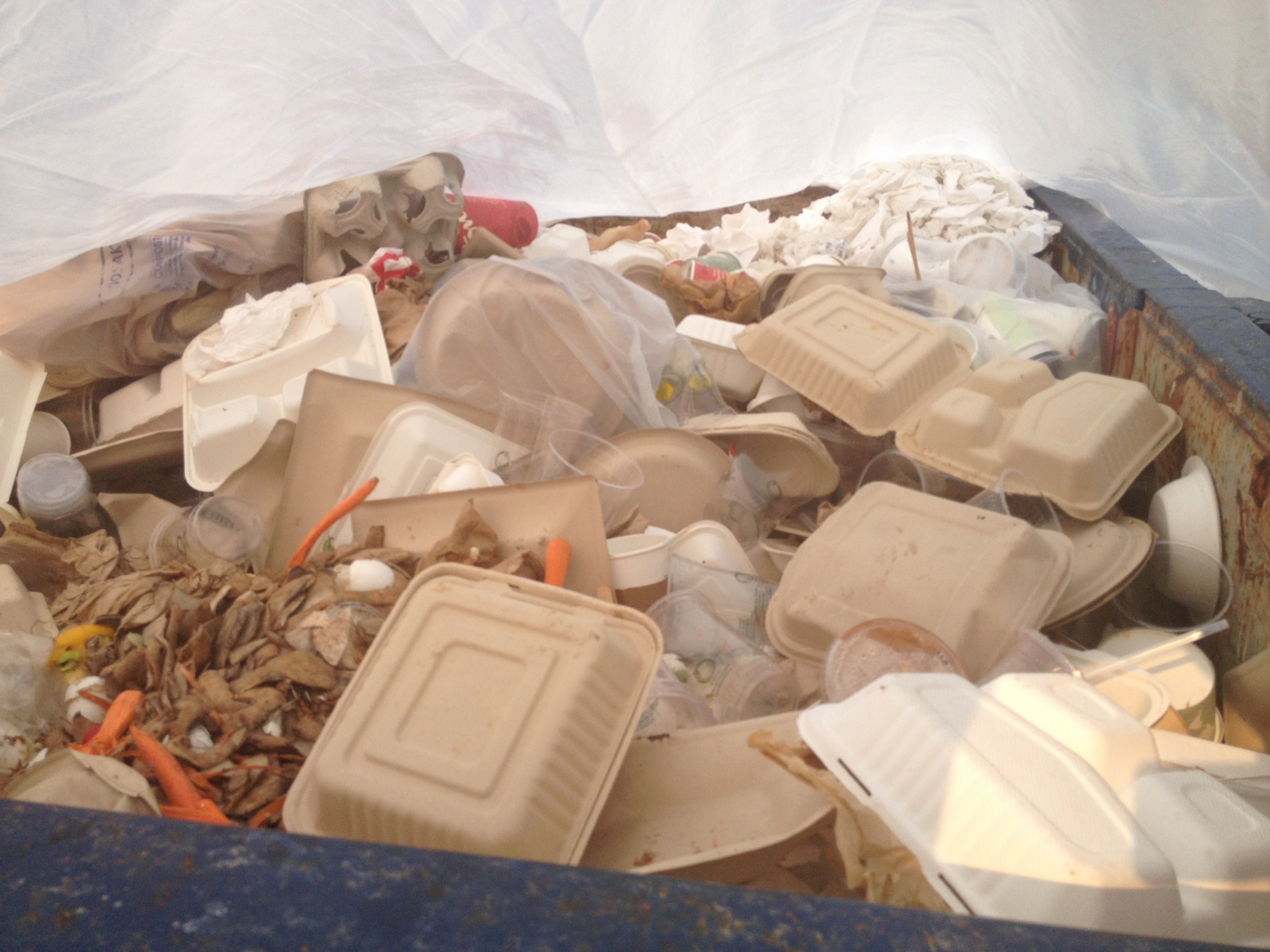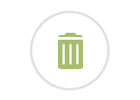
- Have recycling as well as composting bins available and clearly marked for all staff and volunteers
- Ensure photocopiers and printers have the “double-sided” function and the use of this function should be encouraged
- Give purchasing priority to recyclable and post-consumer recycled products
- Minimum the use of colour copies and use black and white printing for documents
- Format any distribution handouts so as to minimize the amount of paper used
- Re-use products wherever possible – waste paper for note taking, old sheets for painting etc.
- Recycle all products that are eligible
- Use the website, e- mail or an app for digital newsletters
- Compost
- Offer reusable mugs or water bottles on site at the festival
- Minimize the use of a registration form or use electronic registration
- Use recyclable or re-usable name tags for volunteers and staff where possible
- Encourage food providers to use ceramic dishes or when necessary to provide disposable containers, ensure they are biodegradable
- Develop a waste management policy that encourages waste sorting and recycling
- Determine the number of participants of the venue prior to printing documents, so as to avoid the surplus printing
- Have a waste audit completed
- Set a waste diversion goal to divert waste from landfill
- Try to phase out all printing and use e-communications and registering and information sharing instead
- When printing printing is necessary, ensure whenever possible that it can be re-used (don’t have dates, make sure it is sturdy)
- Do not sell any disposable water bottles
- Have a sorted recycling system including construction waste materials. Including: fine paper, cardboard/mixed paper, glass, plastic, aluminum, scrap metal, unused food, printer and toner cartridges, printer and toner cartridges, aerosol cans, batteries, and other e-waste
- Collect used maps and guides with a drop box strategically located at exits to reuse for other visitors
- Consider LCD screens for dynamic, onsite information such as a schedule of daily events
- Set a goal to generate zero waste going to the landfill
- Ensure no disposable plastics are used on site (water bottles, glasses, bags, etc.)
- Generate zero hazardous waste
- Use zero persistent toxic chemical
- Where port-a-potties are necessary, opt for dry compostable toilets instead

Waste Facts
Best Practise Case Studies
Recyclable and Biodegrdable
Canada’s Largest Ribfest, Canada
The festival has ensured that the products chosen, such as containers and utensils, meet criteria for recyclability and biodegradability. Here is the list of products that you’ll see at Canada’s Largest Ribfest: Fibre-based Food Containers, Wooden Utensils, Paper Napkins, Corn Starch-based Cups (cold beverages), Fibre-based Cups (hot beverages), Paper Bags. Canada’s Largest Ribfest will provide “Green Bin” (biodegradable) and “Blue Bin” (recycling) containers for the public to use. We will also have several stations where people can take waste to be sorted.
Compostable Everything
Mariposa Folk Festival, Canada
Now, everything the food and beverage vendors at Mariposa serve their food on is 100% compostable. That includes the cups and glasses, bowls, plates, utensils. Of course, all of the food scraps are compostable! You would never know it to look at it or use it, but all of the serving ware at Mariposa is made from 100% renewable resources including wheat and corn starches, sugars and plant oils. This is a major shift away from petroleum products, and these bio-degradable bio-plastics use less energy to produce.
Self Sorting Station
Basscoast Festival, Canada
The main program for the upcoming festival will be a self-sorting station where people are able to sort their garbage and dispose of it appropriately. Basscoast Festival organizers are also planning on tripling their green staff in order to assist with the sorting of waste, and to help keep the area clean over the three-day festival period. This strategy allows the public to witness the amount of waste that is produced over the period of the festival, encouraging them to appropriately recycle their waste, reduce the amount of non-reusable waste, and simultaneously reducing their carbon footprint.
Cups/Cans for Points
Camp Bestival, UK
All beer cups and cans purchased from our bars are worth 10 points each. Collect a load and return them to one of our cup and can return points and you could easily have enough money to buy yourself and your mates a round.
Information App
Ilosaarirock Festival, Finland
The festival schedule is provided as a mobile app instead of paper copies. But when printed copies have to be used, the paper has been awarded the PEFC certificate which proves that the paper comes from sustainably managed forests.
Money Saving Cup
Bonnaroo Music and Arts Festival, United States
In the past the festival provided fans and artists with reusable containers to purchase instead of disposable cups. Seventy-five hundred of them were made available to fans at Bonnaroo, and everyone that bought one got one dollar off every beer they purchased throughout the weekend. The containers were limited edition Bonnaroo refillable stainless steel water bottle with carabineer clip carrier. They could be purchased for only $5 at all concessions stands or at participating vendors.
Reducing Food Festival Waste
Bon Appetite, Ottawa, Canada
Bon Appetite makes an effort to be environmentally conscious. Food samples are served on compostable plates, and all wine samples are served in reusable glasses. There are also multi-purpose waste containers that can receive the recyclable, compostable, and cardboard materials.
24-Hour Greening Stations
10,000 Lakes Festival, United States
At the 10,000 Lakes Festival in Minnesota, attendees are given two plastic bags – a dark one for their trash and a clear one for their recycling. Recycling stations are located in the campgrounds, at the gates, and in the concert area. Attendees are encouraged to keep their trash (especially cigarette butts) and recycled items separated and deposit them at the numerous 24-hour Greening Stations located throughout the venue. Food waste will be composted and used for fertilizer.
Reusable Eco Cup
Pop Montreal, Canada
The festival will be eliminating the use of one-time plastic cups/water bottles and replacing them with reusable eco-cups and stainless steel bottles. A reimbursable deposit of $2 will be implemented into an initial drink purchase. In exchange you will be given a durable Ecocup. We encourage you to reuse this cup for drinks thereafter. At the end of the night, feel free to exchange your cup for $2 back. In exchange, our partners at Ecocup will wash the returned cups and keep them from ending up in the ocean’s arms.
Environmental Choice Program
Winnipeg Folk Festival, Canada
In 1997, the Winnipeg Folk Festival was the first event to be certified by Canada’s Environmental Choice Program. Since then, this festival has taken on different initiative to lessen its impact on the environment. For the past few years, the Winnipeg Folk Festival along with the Edmonton and Vancouver Folk Festivals, have operated a plate program, where washable plates are being reused. Both of these festivals have also have a no Styrofoam policy and use Poly Lactic Acid (PLA) beer cups, which are compostable.
Reducing Packaging
Sled Island, Canada
All vendors at Sled’s main outdoor locations use compostable or recyclable food packaging and food ware: help us prevent waste by putting your throwaways into the appropriate bin. Our Green Team volunteers are on hand to help out if you are unsure. Sled Island prohibits wasteful packaging at the festival, especially plastic water bottles. Instead, why not bring your own reusable bottle—we provide water stations, so you can fill up and stay hydrated.
Cigarette Butt Bins
Camp Bestival, UK
A team from www.no-buts.org.uk will be onsite distributing free Cigarette Butt Bins made from old film canisters and encouraging people to not drop their fag butts on the floor.
Recycle Everything
Cambridge Folk Festival
The festival recycles waste cooking oil at all sites. Each toilet is supplied with a waste paper bin to recycle paper hand towels. The aim is to recycle anything that cannot be used in subsequent festivals. Last year Cambridge Folk Festival recycled stage carpets and the few tents that some people ‘forgot’ to take home through CHYPS (Children and Young Peoples Participation Service) for art projects.
Garbage Bin Reduction
Vancouver Folk Music Festival, Canada
In 2011 the festival reduced the number of garbage cans on the Festival site in hopes of encouraging festival-goers to be mindful of their consumption. Garbage cans were replaced with a new recycling and composting system that now allows guests to recycle paper and plastic, and compost appropriate food products. All cups, stir sticks, eating utensils, and even straws are compostable.
Full Service Waste Stations
Rothbury Festival, United States
The Rothbury Festival strongly encourages attendees to bring their compostable items to one of the many manned compost stations on the grounds. The Rothbury festival has hundreds of manned Waste Reclamation Stations available on-site. These stations accept all compostable food and food service items, as well as any personal items that are biodegradable (like paper). For those items that are not compostable, like bottles and cans, Rothbury provides easy to use full-service recycling.
Volunteer Waste Diversion Plan
Dundas Cactus Festival, Canada
In 2015 the Cactus Festival in Dundas celebrated their 40th anniversary by introducing an ambitious waste diversion program. The program featured four specific waste diversion stations places strategically to encourage all residents to correctly place food waste, compostable and recycling into the correct bin. Eight members of the community were asked to volunteer, and in return got $100 honorarium and a uniform.
Dishwashing Stations
Hillside Festival, Canada
Our Food Vendors serve on sturdy reusable plates. We collect and clean all of the plates, cups and cutlery used throughout the weekend thanks to our amazing crew of Dishwashing Volunteers. On the festival weekend, keep your eyes open for the dish stations outside the Food Pavilion and dish bins, conveniently located along with all recycling and waste containers. You may also bring your dirty dishes to us to wash for you!
Overall Waste Reduction
Bumbershoot Festival, United States
At the Bumbershoot Festival in Seattle, there are recycling bins throughout the grounds. All Styrofoam has been banned. Non-disposable water bottles are encouraged and the use of free water stations provided. Food vendors recycle all grease and turn it in to biodiesel. All vendors take part in the pre-consumer composting program recycling food scraps into compost. Compost stations are set-up around the festival grounds for fans hoping to reduce their waste. Budweiser recycling bins are available in each beer garden.
Recycling Store
Coachella, United States
The Recycling Store and Bottle Exchange program is about creating a positive experience that lasts beyond the festival. Guests collect bottles, cans, cups that they find on the Coachella grounds, and can then swap them for prizes such as tees, refillable bottles, posters, and ferris wheel tickets.
No Bottled Water
Vancouver Folk Music Festival
In an effort to eliminate the contribution to plastic bottle waste, no bottled water is sold on site over the Festival weekend. The festival encourages all Festival-goers to bring their own water containers or to purchase a refillable water bottle at the Merchandise Tent (for a fun Festival souvenir too!). Water stations are located throughout the Festival for refilling water containers – FREE of charge.
Reusable Cups
Island Vibe, Australia
A reusable cup should be top of your packing list if you plan to stay hydrated and caffeinated while navigating Island Vibe Festival. A handy cup wash station will be located within the heart of the food nexus to keep your cup sanitized and sand free. Lead the revolution with your festival vestibule! Disposable cups, even those that can be composted or recycled, continue the cycle of manufacturing and consumerism. Even clear biodegradable cups, designed to degenerate organically use corn grown often in the US, which is plasticized in China, then shipped to Australia where it is used once and then thrown away.
Shambala Festival, UK
All bars at the festival use 100% re-usable glasses. There is a charge of £1 on the very first glass/drink you have, and then subsequent glasses are exchanged free of charge, or a token can be taken if you don’t want another drink at that moment. The levy is to make sure they come back and are reused! All other types of serve ware (e.g. hot drinks) will be 100% compostable.
Splore, New Zealand
Drink responsibly from your reusable cup known as a Globelet. This wonderful drinking vessel can be used again and again throughout the weekend for all cold drinks to be served into from bars, vendors and water outlets. Pay $2.50 with your first drink. Bring a reusable water bottle and fill as required at water outlets.
Recycling Exchange Initiative
Shambala Festival, UK
The festival has a program called the Recycling Exchange initiative. When festivalgoers buy tickets they will be charged a one off £10 “Recycling Deposit”. At the festival, attendees can then exchange two bags handed to them on entry at the Recycling Exchanges – A green bag for mixed dry recyclables and a clear bag for ‘other waste. Either the £10 is refunded there, or you can have a festival pack of irresistible stuff worth £25 (while stocks last). Unclaimed deposits will help pay for staffing this recycling exchange, contribute to offsetting the festival’s carbon footprint and to subsidise other environmental initiatives.


